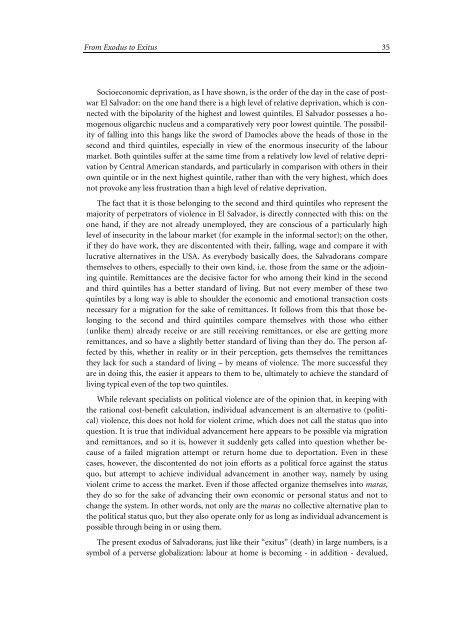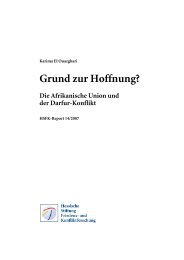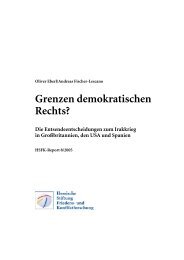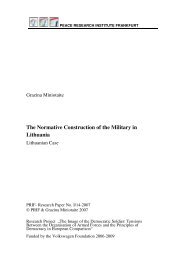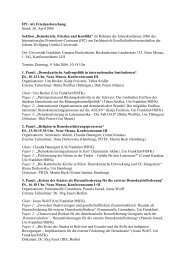From Exodus to Exitus Causes of post-war violence in El ... - eDoc
From Exodus to Exitus Causes of post-war violence in El ... - eDoc
From Exodus to Exitus Causes of post-war violence in El ... - eDoc
Create successful ePaper yourself
Turn your PDF publications into a flip-book with our unique Google optimized e-Paper software.
<strong>From</strong> <strong>Exodus</strong> <strong>to</strong> <strong>Exitus</strong> 35<br />
Socioeconomic deprivation, as I have shown, is the order <strong>of</strong> the day <strong>in</strong> the case <strong>of</strong> <strong>post</strong><strong>war</strong><br />
<strong>El</strong> Salvador: on the one hand there is a high level <strong>of</strong> relative deprivation, which is connected<br />
with the bipolarity <strong>of</strong> the highest and lowest qu<strong>in</strong>tiles. <strong>El</strong> Salvador possesses a homogenous<br />
oligarchic nucleus and a comparatively very poor lowest qu<strong>in</strong>tile. The possibility<br />
<strong>of</strong> fall<strong>in</strong>g <strong>in</strong><strong>to</strong> this hangs like the sword <strong>of</strong> Damocles above the heads <strong>of</strong> those <strong>in</strong> the<br />
second and third qu<strong>in</strong>tiles, especially <strong>in</strong> view <strong>of</strong> the enormous <strong>in</strong>security <strong>of</strong> the labour<br />
market. Both qu<strong>in</strong>tiles suffer at the same time from a relatively low level <strong>of</strong> relative deprivation<br />
by Central American standards, and particularly <strong>in</strong> comparison with others <strong>in</strong> their<br />
own qu<strong>in</strong>tile or <strong>in</strong> the next highest qu<strong>in</strong>tile, rather than with the very highest, which does<br />
not provoke any less frustration than a high level <strong>of</strong> relative deprivation.<br />
The fact that it is those belong<strong>in</strong>g <strong>to</strong> the second and third qu<strong>in</strong>tiles who represent the<br />
majority <strong>of</strong> perpetra<strong>to</strong>rs <strong>of</strong> <strong>violence</strong> <strong>in</strong> <strong>El</strong> Salvador, is directly connected with this: on the<br />
one hand, if they are not already unemployed, they are conscious <strong>of</strong> a particularly high<br />
level <strong>of</strong> <strong>in</strong>security <strong>in</strong> the labour market (for example <strong>in</strong> the <strong>in</strong>formal sec<strong>to</strong>r); on the other,<br />
if they do have work, they are discontented with their, fall<strong>in</strong>g, wage and compare it with<br />
lucrative alternatives <strong>in</strong> the USA. As everybody basically does, the Salvadorans compare<br />
themselves <strong>to</strong> others, especially <strong>to</strong> their own k<strong>in</strong>d, i.e. those from the same or the adjo<strong>in</strong><strong>in</strong>g<br />
qu<strong>in</strong>tile. Remittances are the decisive fac<strong>to</strong>r for who among their k<strong>in</strong>d <strong>in</strong> the second<br />
and third qu<strong>in</strong>tiles has a better standard <strong>of</strong> liv<strong>in</strong>g. But not every member <strong>of</strong> these two<br />
qu<strong>in</strong>tiles by a long way is able <strong>to</strong> shoulder the economic and emotional transaction costs<br />
necessary for a migration for the sake <strong>of</strong> remittances. It follows from this that those belong<strong>in</strong>g<br />
<strong>to</strong> the second and third qu<strong>in</strong>tiles compare themselves with those who either<br />
(unlike them) already receive or are still receiv<strong>in</strong>g remittances, or else are gett<strong>in</strong>g more<br />
remittances, and so have a slightly better standard <strong>of</strong> liv<strong>in</strong>g than they do. The person affected<br />
by this, whether <strong>in</strong> reality or <strong>in</strong> their perception, gets themselves the remittances<br />
they lack for such a standard <strong>of</strong> liv<strong>in</strong>g – by means <strong>of</strong> <strong>violence</strong>. The more successful they<br />
are <strong>in</strong> do<strong>in</strong>g this, the easier it appears <strong>to</strong> them <strong>to</strong> be, ultimately <strong>to</strong> achieve the standard <strong>of</strong><br />
liv<strong>in</strong>g typical even <strong>of</strong> the <strong>to</strong>p two qu<strong>in</strong>tiles.<br />
While relevant specialists on political <strong>violence</strong> are <strong>of</strong> the op<strong>in</strong>ion that, <strong>in</strong> keep<strong>in</strong>g with<br />
the rational cost-benefit calculation, <strong>in</strong>dividual advancement is an alternative <strong>to</strong> (political)<br />
<strong>violence</strong>, this does not hold for violent crime, which does not call the status quo <strong>in</strong><strong>to</strong><br />
question. It is true that <strong>in</strong>dividual advancement here appears <strong>to</strong> be possible via migration<br />
and remittances, and so it is, however it suddenly gets called <strong>in</strong><strong>to</strong> question whether because<br />
<strong>of</strong> a failed migration attempt or return home due <strong>to</strong> deportation. Even <strong>in</strong> these<br />
cases, however, the discontented do not jo<strong>in</strong> efforts as a political force aga<strong>in</strong>st the status<br />
quo, but attempt <strong>to</strong> achieve <strong>in</strong>dividual advancement <strong>in</strong> another way, namely by us<strong>in</strong>g<br />
violent crime <strong>to</strong> access the market. Even if those affected organize themselves <strong>in</strong><strong>to</strong> maras,<br />
they do so for the sake <strong>of</strong> advanc<strong>in</strong>g their own economic or personal status and not <strong>to</strong><br />
change the system. In other words, not only are the maras no collective alternative plan <strong>to</strong><br />
the political status quo, but they also operate only for as long as <strong>in</strong>dividual advancement is<br />
possible through be<strong>in</strong>g <strong>in</strong> or us<strong>in</strong>g them.<br />
The present exodus <strong>of</strong> Salvadorans, just like their “exitus” (death) <strong>in</strong> large numbers, is a<br />
symbol <strong>of</strong> a perverse globalization: labour at home is becom<strong>in</strong>g - <strong>in</strong> addition - devalued,


